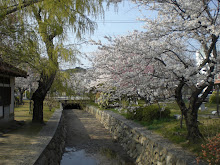Last weekend we had the good luck to get a tour of a local sake brewery, on a day when it's normally closed, because of an acquaintance.
I've not been a big fan of Sake so far. It's got its own peculiarities, and I'll be honest-I feel like so far, I've not had much good stuff.
Until last weekend...
Yamagata Sakagura was founded in Shunan city 130 years ago by the great-grandfather of the current owner. That current owner, Toshiro Yamagata, has expanded from just owning a single brewery, to heading a multinational Sake distribution firm with offices in New York, LA, and Korea. But he still found the time to take us through his brewery on his day off...
If you want details about the general process of making Sake, you could do worse than visiting the website of the Japan Sake Brewer's Association.
Our tour followed this chart, basically.
We started at the beginning, with rice.
When sake is made, the rice is first polished. It starts with it's brown, protein rich hull, but it polished down to the white, starchy core. The amount of polishing has a direct effect on the flavor and price of a sake.
(From the Japan Sake Brewer's Association Website) Ginjoshu-Sake made using white rice which has been milled so that 60% or less of the grain remains. It also contains rice koji and water, and may contain all of these ingredients plus brewing alcohol. It is characterized by a fruity, somewhat floral bouquet and a clear, crisp flavor. If the rice is polished down to 50% or less, the sake is called Dai-ginjoshu.
Here is an example of the rice. The top row, of course, is unpolished brown rice. The bottom row is polished--Left side is polished 50%, the middle is down to 35%, the right is down to 70%. The middle rice takes 70 hours of polishing to reach its tiny size, and the sake it produces is a light, sweet one with an amazing balance of flavor (to my unsophisticated palate) and is, to me, the most drinkable sake I've ever tried.
It's also the priciest. Yamagata's "Moriko Chou-Toku Sen Dai Ginjoshu", Or "Moriko Extra-special Select Dai-Ginjoshu" runs about $30 for a 720ml bottle. But apparently, in the states, it runs about $100.
We were treated to this sake, not only freshly tapped from the tank but in its "Genshu" state, meaning that it was undiluted for bottling. Before sake is bottled for selling, it is often cut with water to bring the alcohol level to 14-17%. Before bottling, as Genshu, it's usually 20-22%.
It do have a kick, but it is just lovely...and the owner was generous enough to give us bottles of it to take home.
So here are some pics of the brewery...
The polished rice, ready for washing and watering.
After it's washed, it's steamed soft and then cooled to 40 degrees C, at which point the Koji, a microbe that turns the rice starch into sugar, is added. Then water and yeast, which turns the sugars into alcohol, are added, and in about 24 days you have sake.
This is a tank of starter--rice, Koji and yeast.
These tanks are brewing away, and smell fantastic.
We were allowed to taste sake in process, this one was about 18 days in. The alcohol content was about 14%. It was a sweet, full flavor, with lots of rice flavor and a touch of carbonation. Quite drinkable, too.
After fermentation is done, the sake is pumped to this big filter press, where the rice solids, or lees, are filtered and pressed.
The lees make a foodstuff called "Pressed Sake Cake" or Kasu. This is used in soups or to make a sweet, very low-alcohol festival drink called Amazake.
Soft kasu.
Hard kasu. It tasted about like you would expect--starchy and slightly sweet, with some alcohol bite. Not bad at all...
After pressing, the sake is lightly filtered again, and then pasteurized at low heat (about 60 C) to kill any bacteria that might spoil the sake.
Then it's stored for a few days to settle down a bit, and bottled.
These tanks hold 46,000 liters, or about 15,000 gallons. There were ten of them, but not all were full.
It was, in all, a heck of a tour, and the owner was so friendly and enjoyable to talk to that I almost want to go back next weekend.
The free sake didn't hurt, either.
Sunday, March 6, 2011
A Sake Is Born
Subscribe to:
Post Comments (Atom)











No comments:
Post a Comment